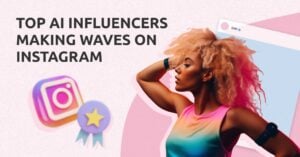
The Rise of AI Influencers in Social Media Marketing
As the digital landscape evolves, an intriguing development has emerged: the rise of AI influencers, transforming the sphere of social media marketing, particularly on platforms like Instagram. Unlike traditional influencers, who are flesh-and-blood personalities, these digital or virtual influencers are meticulously crafted using computer-generated imagery (CGI) and artificial intelligence (AI). They represent a novel approach to branding, driven by tools such as Midjourney and Stable Diffusion that enhance their personalization.
In recent years, AI influencers have garnered attention due to their remarkable customizability. Brands can tailor these AI characters to resonate with specific demographics, enabling marketers to create personal connections with targeted audiences. Notably, approximately 48.7% of marketers are now regularly incorporating AI influencers into their strategies, harnessing their ability to deliver consistent and tailored content that aligns seamlessly with brand identities.
The advantages of employing AI influencers are compelling. They offer an unparalleled level of consistency in branding, carefully maintaining company narratives without the emotional unpredictability human influencers may encounter. Furthermore, AI influencers are perpetually available, unaffected by scheduling conflicts or health issues, which translates to a robust marketing presence around the clock. Their non-controversial nature shields brands from the pitfalls often associated with human celebrities, while the cost-effectiveness of these virtual personas, once developed, poses significant economic benefits for companies.
Prominent examples of successful AI influencers further underscore this trend. Lu do Magalu, with over 7.1 million followers, has effectively collaborated with global brands like McDonald’s and Adidas. Similarly, Lil Miquela, a robot celebrity and music artist, boasts 2.5 million followers, having engaged with major fashion houses and solidified her status as a cultural figure. Environmental advocate Leya Love, alongside others such as Imma and Bermuda, exemplifies the diverse roles these digital figures play in raising awareness and driving brand engagement.
Despite their growing popularity, the public perception of AI influencers remains a mixed bag. While some regard them as innovative embodiments of marketing, others express skepticism regarding their authenticity. To navigate this complex landscape, brands must embrace transparency about the AI nature of these characters. The ethical implications surrounding manipulation and misinformation present further challenges that warrant careful consideration by marketers aiming to maintain audience trust.
The potential synergy between AI influencers and tools like URL shorteners and link management systems remains a significant avenue for exploring consumer engagement. By leveraging AI influencers in conjunction with effective URL strategies, brands can monitor engagement metrics and refine their campaigns in real-time, maximizing conversion rates and enhancing overall marketing effectiveness.
Ultimately, AI influencers signify a paradigm shift within the influencer marketing terrain, enabling brands to forge innovative connections with their audiences. As the pace of AI technology accelerates, the role of these virtual influencers is poised to expand. However, keen awareness of public sentiment and ethical considerations will be paramount for brands eager to capitalize on this groundbreaking trend while ensuring trust and authenticity remain at the forefront of their marketing initiatives.
Industry Tags: #BitIgniter #LinksGPT #UrlExpander #UrlShortener #AIInfluencers #DigitalMarketing #MarketingInnovation
Want to know more: https://influencermarketinghub.com/ai-influencers-instagram/

